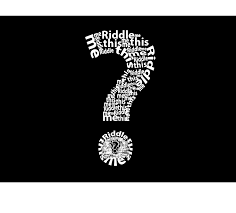riddle
推荐文章

vt. 解谜;给...出谜;充满于
n. 谜语;粗筛;谜一般的人、东西、事情等
vi. 出谜
n. (Riddle)人名;(英)里德尔
n.
粗筛;谜语;猜不透的难题,难解之谜;
v.
用筛分选(卵石等),筛分;用子弹把耙子打成蜂窝似的;精查(证据);解(谜),猜
变形
复数:riddles过去式:riddled过去分词:riddled现在分词:riddling第三人称单数:riddles
双语释义
n.(名词)[C]谜(语) a puzzling and often amusing question to which one must guess the answer
[C]猜不透的难题,难解之谜 mysterious situation or thing
英英释义
riddle[ 'ridl ]
n.
a difficult problem
同义词:conundrumenigmabrain-teaser
a coarse sieve (as for gravel)
v.
pierce with many holes
"The bullets riddled his body"
set a difficult problem or riddle
"riddle me a riddle"
separate with a riddle, as grain from chaff
同义词:screen
spread or diffuse through
"His campaign was riddled with accusations and personal attacks"
同义词:permeatepervadepenetrateinterpenetratediffuseimbue
speak in riddles
explain a riddle
同近义词辨析
puzzle, mystery, riddle, problem这组词都有“谜、难题”的意思,其区别是:
puzzle语气较强,指复杂令人费解的情况或问题。
mystery指常人难以认识其起因或性质的奥秘,或指有意不让人理解的奥妙。
riddle指供人猜的谜语游戏,也可指终究会有解答的难题。
problem指有待探讨的疑难问题,也可指令人困惑的情况。
双语例句
用作名词(n.)
That painting is still a riddle to us.
那幅画对我们仍然是个谜。
He could not solve the riddle.
他猜不出这个谜。
He got the answer to the riddle as quick as a flash.
他一下子就猜中了谜底。
The riddle was at last unriddled.
这个谜语终于得到了解答。
用作及物动词(vt.)
She loved to riddle out the solution to problems.
她喜欢解答问题。
The door was riddled with shots.
门被子弹打得尽是窟窿。
Stay where you are,or I'll riddle you with bullet holes.
不要乱动,不然我就把你打得满身是弹孔。
His daily work is to riddle coal cinders to get out the larger pieces.
他每天的工作是用粗筛筛煤渣,将大块的煤渣挑出来。
权威例句
Revisiting an old riddle: what determines genetic diversity levels within species?The calcareous riddle: Why are there so many calciphilous species in the Central European flora?
“Aha!” effects in a guessing riddle task: An event-related potential study
8 – Allelopathy, Koch's Postulates, and the Neck Riddle
Riddle: what do aplastic anemia, paroxysmal nocturnal hemoglobinuria (PNH) and "hypoplastic"leukemia have in common?
The human mast cell tryptase tetramer: a fascinating riddle solved by structure.
The problem of clonality in aplastic anemia: Dr Dameshek's riddle, restated
Chronic granulomatous disease: the solving of a clinical riddle at the molecular level.
Chromophore environment provides clue to "Kindling Fluorescent Protein"riddle.
Service-Led Growth: The Role of the Service Sector in World Development by Dorothy I. Riddle
riddle
riddle: [OE] English has two separate words riddle. The ‘puzzling’ sort of riddle is etymologically something you ‘read’. For it originated as a derivative of Old English rǣdan, the ancestor of modern English read. One of its earlier meanings was ‘interpret’ – hence riddle. Riddle ‘sieve’ goes back to a prehistoric German khrid- ‘shake’, which also produced German dialect reiter ‘sieve’. It is also related to Latin crībrum ‘sieve’ and cernere ‘separate’ (source of English decree, discern, secret, etc).=> read; certain, decree, discern, secret
riddle (n.1)
"A word game or joke, comprising a question or statement couched in deliberately puzzling terms, propounded for solving by the hearer/reader using clues embedded within that wording" [Oxford Dictionary of English Folklore], early 13c., from Old English rædels "riddle; counsel; conjecture; imagination; discussion," common Germanic (Old Frisian riedsal "riddle," Old Saxon radisli, Middle Dutch raetsel, Dutch raadsel, Old High German radisle, German Rätsel "riddle"). The first element is from Proto-Germanic *redaz-, from PIE *re-dh-, from PIE *re(1)- "to reason, count" (cognates: Old English rædan "to advise, counsel, read, guess;" see read (v.)). The ending is Old English noun suffix -els, the -s of which later was mistaken for a plural affix and stripped off. Meaning "anything which puzzles or perplexes" is from late 14c.
riddle (v.1)
"perforate with many holes," 1817 (implied in riddled), earlier "sift" (early 13c.), from Middle English ridelle "coarse sieve," from late Old English hriddel "sieve," altered by dissimilation from Old English hridder "sieve" (see riddle (n.2)).
riddle (n.2)
"coarse sieve," mid-14c., alteration of late Old English hriddel, dissimilated from hridder, from Proto-Germanic *hrida- (cognates: German Reiter), from PIE root *krei- "to sieve," and thus related to Latin cribrum "sieve, riddle," Greek krinein "to separate, distinguish, decide" (see crisis).
riddle (v.2)
"to pose as a riddle," 1570s, from riddle (n.1). Related: Riddled; riddler; riddling.
1. dressing riddle
下筛|细筛
-- 来源 -- 英汉 - 翻译参考[网络]
2. Riddle me, riddle me what it is.= Riddle me my riddle, what is this?
你来猜,这是什么?
-- 来源 -- 英汉 - 辞典例句
3. Riddle my riddle, what is this?
给你猜一个谜,你猜这是什么谜?
-- 来源 -- 英汉 - 辞典例句
4. oscillating riddle
摆动筛
-- 来源 -- 英汉 - 翻译参考[网络]
5. Riddle me, riddle me, randy ro.
让我猜,让我猜,嗨哟嗬。
-- 来源 -- 汉英 - 翻译参考
6. separator riddle
逐稿器
-- 来源 -- 英汉 - 翻译参考[网络]
7. All is riddle, and the key to a riddle is another riddle.
爱默生:所有的事物都是谜团,而解开一个谜的钥匙是另一个谜。
-- 来源 -- www.cssareading.org
